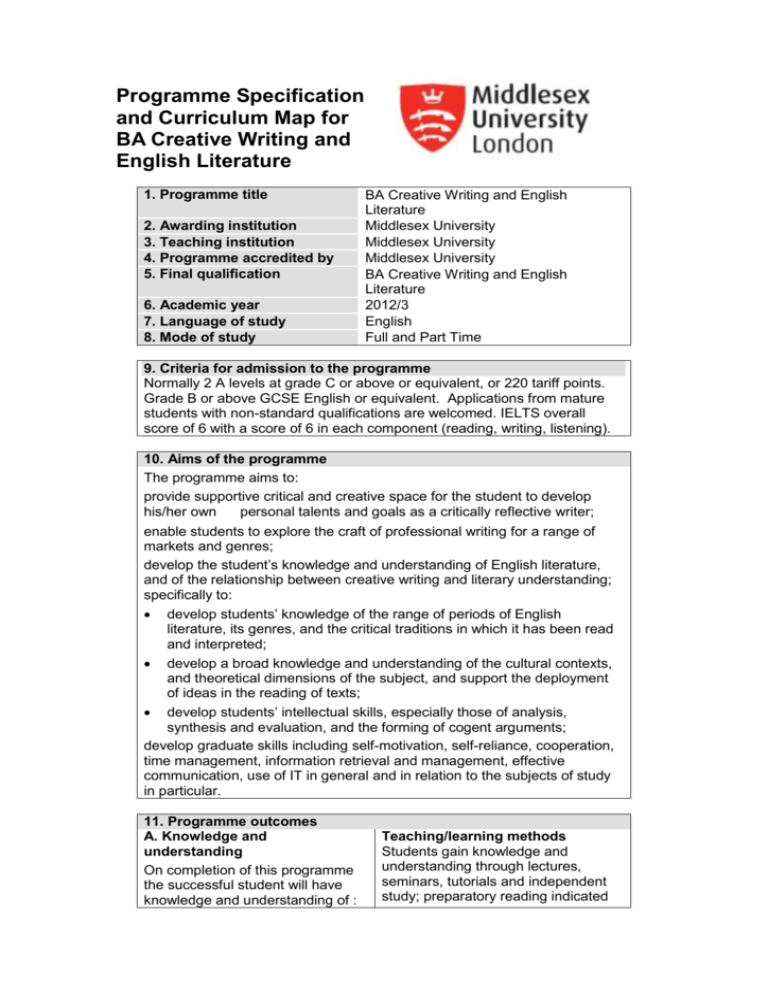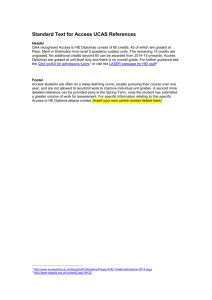Creative Writing and English Literature
advertisement

Programme Specification and Curriculum Map for BA Creative Writing and English Literature 1. Programme title 2. Awarding institution 3. Teaching institution 4. Programme accredited by 5. Final qualification 6. Academic year 7. Language of study 8. Mode of study BA Creative Writing and English Literature Middlesex University Middlesex University Middlesex University BA Creative Writing and English Literature 2012/3 English Full and Part Time 9. Criteria for admission to the programme Normally 2 A levels at grade C or above or equivalent, or 220 tariff points. Grade B or above GCSE English or equivalent. Applications from mature students with non-standard qualifications are welcomed. IELTS overall score of 6 with a score of 6 in each component (reading, writing, listening). 10. Aims of the programme The programme aims to: provide supportive critical and creative space for the student to develop his/her own personal talents and goals as a critically reflective writer; enable students to explore the craft of professional writing for a range of markets and genres; develop the student’s knowledge and understanding of English literature, and of the relationship between creative writing and literary understanding; specifically to: develop students’ knowledge of the range of periods of English literature, its genres, and the critical traditions in which it has been read and interpreted; develop a broad knowledge and understanding of the cultural contexts, and theoretical dimensions of the subject, and support the deployment of ideas in the reading of texts; develop students’ intellectual skills, especially those of analysis, synthesis and evaluation, and the forming of cogent arguments; develop graduate skills including self-motivation, self-reliance, cooperation, time management, information retrieval and management, effective communication, use of IT in general and in relation to the subjects of study in particular. 11. Programme outcomes A. Knowledge and understanding On completion of this programme the successful student will have knowledge and understanding of : Teaching/learning methods Students gain knowledge and understanding through lectures, seminars, tutorials and independent study; preparatory reading indicated 1. the writing process 2. his/her self development as a creative writer 3. relevant classic and contemporary texts and writing styles 4. Linguistic, literary, cultural and socio-historical contexts in which literature is written and read 5. The role of literary criticism in shaping literary interpretation and value 6. The distinctive nature of texts written in the principal literary genres B. Cognitive (thinking) skills On completion of this programme the successful student will be able to: 1. analyse texts structurally and stylistically, developing skills of close reading and analysis 2. give and receive critical feedback, developing independent judgement 3. evaluate, re-draft and edit their own work 4. conceive, plan and develop a structured piece of written work 5. Articulate knowledge and understanding of texts, concepts and theories relating to English studies at an abstract level 6. Understand, interrogate and apply a variety of theoretical positions and weigh the importance of alternative perspectives. D. Graduate Skills On completion of this programme the successful student will be able to: 1. further their own personal and career development by tutors; writing exercises, reading, listening, discussing, analysing, redoing within self-directed learning, tutor and peer feedback, tutorials, tutor-led workshops, project work, guest and staff lectures, peer-group learning and team work. Assessment Method Students’ knowledge and understanding is assessed by portfolios of creative writing, normally including a final creative piece and a critical statement which makes reference to relevant texts and practice; coursework essays, unseen and seen examinations, project-work. Teaching/learning methods Students learn cognitive skills through individual practice, tutorials, tutor-led workshops, reading, discussion, group work and contact with practising writers; reading and discussion of key issues raised; practice in applying concepts and analysis, both orally and in writing. Assessment Method Students’ cognitive skills are assessed by: original creative work and a critical statement examining process and context, including drafts and bibliography; essays which will be evaluated with regard to the coherence of the topic treated; the appropriateness of the approach adopted; evidence of critical and independent discussion; also seminar discussions and tutorials, where attention will be given to analytical skills, and which will provide feedback on progress. Teaching/learning methods Students acquire graduate skills through the tutor led workshops, feedback, self-directed learning and group work which leads up to assessed coursework; seminars, tutorials, independent study; lecturing staff encourage students to develop a 2. take responsibility for effective learning, 3. communicate effectively, orally and in writing 4. work as a member of a team 5. use relevant Information Technology and be numerate, as appropriate to field of study 6. generate imaginative ideas and see them through to fruition. reflexive awareness of their needs as learners. Assessment method Students’ graduate skills are assessed by creative projects and oral presentations; coursework essays, project work, practice-based material; seminar attendance, in-session and written feedback. 12. Programme structure (levels, modules, credits and progression requirements) 12. 1 Overall structure of the programme The programme is normally studied over three years full-time or completed within six years part time. The honours degree requires 360 credits at Level 1 and above, of which 250 credits are at Level 2 or above and 120 credits at Level 3. Details below are for a full-time student. BA Creative Writing and Journalism Studies is structured as follows: Year One – all compulsory 1) CMW1001 Introduction to Writing A: Fiction and Poetry (30 credits) 2) CMW1002 Introduction to Writing B: Drama and Non-Fiction (30 credits) 3) JCM1000 Introduction to Journalism (30 credits) 4) MCS1000 Issues in Media, Politics and Culture (30 credits) Year Two (1) and (2) CHOICE AT LEAST ONE OF CMW 2002 Exploring Writing B: Fiction (30 credits) OR MDA2100 Screenwriting – The Short Film (30 credits) OR (IF ANY CHOICES LEFT) PLM3002 Writing the City (30 credits) OR CMW 3009 Poetry and Lyrics (30 credits) OR CMW3006 Writing and Publishing Genre (30 credits) 3) JCM2000 Core Issues in Journalism and Communication (30 credits) 4) CHOICE OF: JCM2100 Critical Feature-Writing and Editing (30 credits) OR JCM2200 International Journalisms and Global News Media (30 credits) OR PLM2002 Writing and Publishing Online and Electronic Media (30 credits) Year Three 1) CMW3002 Independent Project (Single Weight) (30 credits) – compulsory 2) CHOICE OF: CMW 3003 Writing in Practice 2 [work placement module] (30 credits) OR CMW3006 Writing and Publishing Genre (30 credits) OR PLM3002 Writing the City (30 credits) OR CMW 3009 Poetry and Lyrics (30 credits) (3) AND (4) TWO OF THE FOLLOWING: JCM3100 Photojournalism and Visual Culture (30 credits) OR JCM3200 Media, Events, Ethics (30 credits) (not running 09/10 – available 10/11) OR PLM3002 Writing the City (30 credits) OR JCM3001 Campaign Journalism and Critical Writing (30 credits) 12.2 Levels and modules Starting in academic year 2010/11 the University is changing the way it references modules to state the level of study in which these are delivered. This is to comply with the national Framework for Higher Education Qualifications. This implementation will be a gradual process whilst records are updated. Therefore the old coding is bracketed below. Level 4 (1) COMPULSORY OPTIONAL PROGRESSION REQUIREMENTS Students must take all of the following: Completion of 120 CMW1001 credits CMW1002 ELS1301 ELS1302 Level 5 (2) COMPULSORY OPTIONAL PROGRESSION REQUIREMENTS Students must take all of the following: Students must also choose at least ONE from the following: ELS2303 ELS2301 CMW2001 MDA2100 If any options remain, one of: PLM3002 CMW3009 Completion of 240 credits OPTIONAL PROGRESSION REQUIREMENTS Level 6 (3) COMPULSORY Students must take all of the following: Students must also choose ONE of the following: CMW3002 ELS3304 CMW3003 CMW3006 PLM3002* CMW3009* [*if not taken at L2] And ONE of the following: ELS3301 ELS3302 ELS3303 Completion of 360 credits 12.3 Non-compensatable modules (note statement in 12.2 regarding FHEQ levels) Module level Module code Level 1 ELS 1301 Level 2 Level 3 CMW 3002, ELS3304 13. A curriculum map relating learning outcomes to modules See Curriculum Map attached 14. Information about assessment regulations Middlesex University Regulations at http://www.mdx.ac.uk/regulations 15. Placement opportunities, requirements and support (if applicable) CMW3003 Writing in Practice 2, taken in Level 3, includes the option of work experience. Supported by the Placement Office. 16. Future careers (if applicable) CMW has strong links with the employment market. The qualification is valued both as a general humanities degree and as a specialist writing degree. Recent Writing graduates are now working in newspapers, magazines, television production, children's publishing, adult publishing, writing therapy, P.R., theatre, libraries, advertising and teaching. Other graduates have gone on to launch their own freelance careers as writers or to take postgraduate courses which further develop their writing. English is recognised as a premier degree providing an excellent basis for careers in media, journalism, administration and management, public services. Its knowledge content can be used directly in careers in primary, secondary and tertiary education, publishing and media, as well as in postgraduate study and research. 17. Particular support for learning (if applicable) Staff teaching on the programme are published literary critics and scholars, novelists, short story writers, poets, scriptwriters and journalists and are research-active in the areas of literary studies and the pedagogy of creative writing. 18. JACS code (or other relevant coding system) 19. Relevant QAA subject benchmark group(s) WP 83; Q300 T BA/English Draft English benchmark; 20. Reference points The following reference points were used in designing the programme: Middlesex University Regulations http://www.mdx.ac.uk/regulations/ QAA level descriptors and benchmark statements QAA framework for HE qualifications University and School mission and value statements Student, Staff, External Examiners’ and Graduates’ feedback and comments Middlesex University Learning and Teaching Policy and Strategy; the Corporate Plan. Please note programme specifications provide a concise summary of the main features of the programme and the learning outcomes that a typical student might reasonably be expected to achieve if s/he takes full advantage of the learning opportunities that are provided. More detailed information about the programme can be found in the student programme handbook and the University Regulations.







